高级英语第二课doc
- 格式:doc
- 大小:28.50 KB
- 文档页数:2
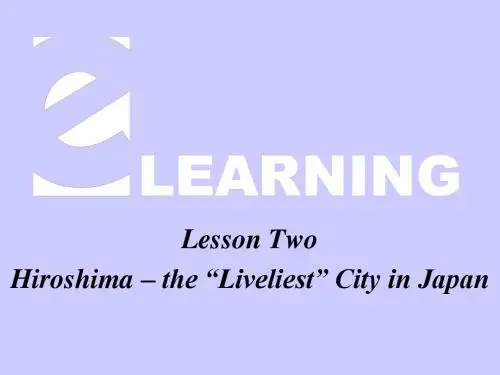
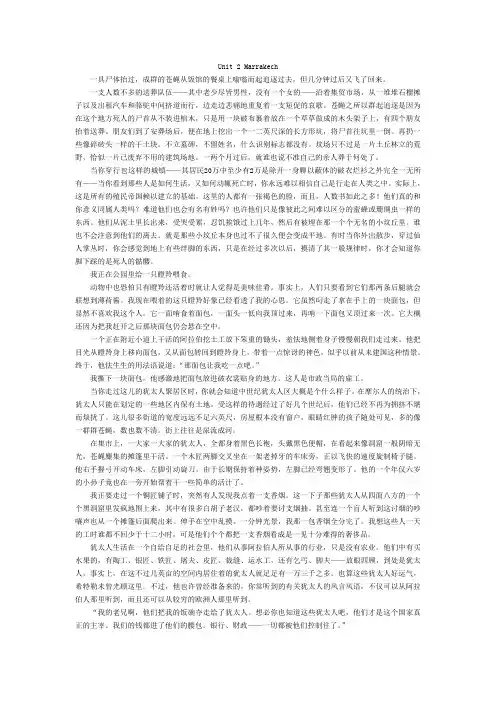
Unit 2 Marrakech一具尸体抬过,成群的苍蝇从饭馆的餐桌上嗡嗡而起追逐过去,但几分钟过后又飞了回来。
一支人数不多的送葬队伍——其中老少尽皆男性,没有一个女的——沿着集贸市场,从一堆堆石榴摊子以及出租汽车和骆驼中间挤道而行,边走边悲痛地重复着一支短促的哀歌。
苍蝇之所以群起追逐是因为在这个地方死人的尸首从不装进棺木,只是用一块破布裹着放在一个草草做成的木头架子上,有四个朋友抬着送葬。
朋友们到了安葬场后,便在地上挖出一个一二英尺深的长方形坑,将尸首往坑里一倒。
再扔一些像碎砖头一样的干土块。
不立墓碑,不留姓名,什么识别标志都没有。
坟场只不过是一片土丘林立的荒野,恰似一片已废弃不用的建筑场地。
一两个月过后,就谁也说不准自己的亲人葬于何处了。
当你穿行也这样的城镇——其居民20万中至少有2万是除开一身聊以蔽体的破衣烂衫之外完全一无所有——当你看到那些人是如何生活,又如何动辄死亡时,你永远难以相信自己是行走在人类之中。
实际上,这是所有的殖民帝国赖以建立的基础。
这里的人都有一张褐色的脸,而且,人数书如此之多!他们真的和你意义同属人类吗?难道他们也会有名有姓吗?也许他们只是像彼此之间难以区分的蜜蜂或珊瑚虫一样的东西。
他们从泥土里长出来,受哭受累,忍饥挨饿过上几年,然后有被埋在那一个个无名的小坟丘里。
谁也不会注意到他们的离去。
就是那些小坟丘本身也过不了很久便会变成平地。
有时当你外出散步,穿过仙人掌丛时,你会感觉到地上有些绊脚的东西,只是在经过多次以后,摸清了其一般规律时,你才会知道你脚下踩的是死人的骷髅。
我正在公园里给一只瞪羚喂食。
动物中也恐怕只有瞪羚还活着时就让人觉得是美味佳肴。
事实上,人们只要看到它们那两条后腿就会联想到薄荷酱。
我现在喂着的这只瞪羚好象已经看透了我的心思。
它虽然叼走了拿在手上的一块面包,但显然不喜欢我这个人。
它一面啃食着面包,一面头一低向我顶过来,再啃一下面包又顶过来一次。
它大概还因为把我赶开之后那块面包仍会悬在空中。
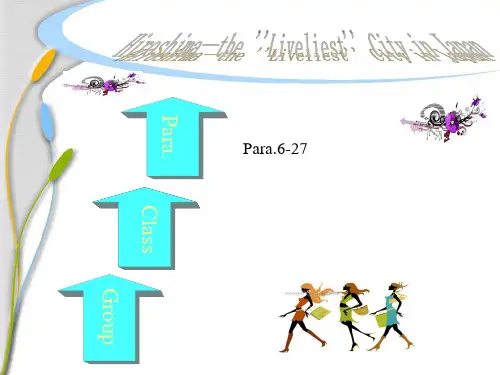
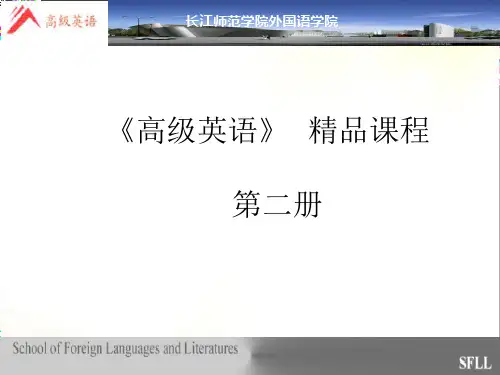
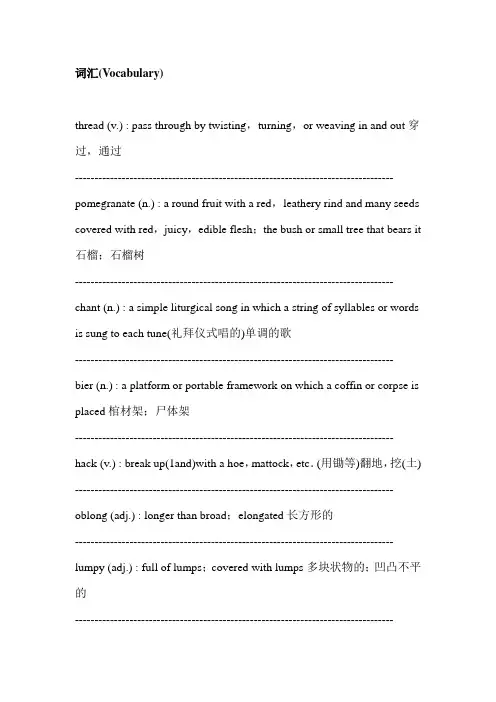
词汇(Vocabulary)thread (v.) : pass through by twisting,turning,or weaving in and out穿过,通过---------------------------------------------------------------------------------- pomegranate (n.) : a round fruit with a red,leathery rind and many seeds covered with red,juicy,edible flesh;the bush or small tree that bears it 石榴;石榴树---------------------------------------------------------------------------------- chant (n.) : a simple liturgical song in which a string of syllables or words is sung to each tune(礼拜仪式唱的)单调的歌----------------------------------------------------------------------------------bier (n.) : a platform or portable framework on which a coffin or corpse is placed棺材架;尸体架---------------------------------------------------------------------------------- hack (v.) : break up(1and)with a hoe,mattock,etc.(用锄等)翻地,挖(土) ---------------------------------------------------------------------------------- oblong (adj.) : longer than broad;elongated长方形的---------------------------------------------------------------------------------- lumpy (adj.) : full of lumps;covered with lumps多块状物的;凹凸不平的----------------------------------------------------------------------------------hummocky (a.) : full of or looking like low,rounded hills布满小丘的;似小圆丘的---------------------------------------------------------------------------------- derelict (adj.) : deserted by the owner;abandoned;forsaken无主的;被遗弃的----------------------------------------------------------------------------------lot (n.) : a plot of ground一块地---------------------------------------------------------------------------------- undifferentiated (adj.) : without clear qualities or distinctive characteristics无区别的;无显著特点的---------------------------------------------------------------------------------- mound (n.) : a heap or bank of earth,sand,etc.built over a grave,in a fortification,etc.土堆;堤;坟堆---------------------------------------------------------------------------------- prickly (adj.) : full of prickles多刺的---------------------------------------------------------------------------------- prickly pear: any of a genus of cactus plants having cylindrical or large,flat,oval stem joints and edible fruits仙人掌(属)---------------------------------------------------------------------------------- bumpy (adj.) : full of bumps;rough;jolting崎岖不平的;颠簸的;震摇的----------------------------------------------------------------------------------gazelle (n.) : any of various small,swift,graceful antelopes瞪羚---------------------------------------------------------------------------------- hindquarter (n.) : either of the two hind legs and the adjoining loin of a carcass of veal,beef,lamb,etc.;[p1.]the hind part of a four—legged animal(牛、羊、猪等的)后腿肉;[复](四肢动物的)后躯---------------------------------------------------------------------------------- nibble (v.) : take small,cautious,or gentle bites小口地咬;谨慎地咬(啃) ----------------------------------------------------------------------------------butt (v.) : strike or push with the head or horns:ram with the head(用头或角)撞击;顶撞---------------------------------------------------------------------------------- mid—air (n.) : any point in space,not in contact with the ground or other surface空中;上空---------------------------------------------------------------------------------- navvy (n.) : n unskilled laborer,as on canals,roads,etc.劳工;无特殊技术的工人---------------------------------------------------------------------------------- sidle (v.) : move sideways,esp.in a shy or stealthy manner(羞怯或偷偷地)侧身行走---------------------------------------------------------------------------------- stow (v.) : pack or store away;fill by packing in an orderly way装载;装进;收藏municipality n.a city,town. etc.having its own incorporated government for local affairs自治市(或镇)----------------------------------------------------------------------------------ghetto (n.) : (in certain European cities)a section to which Jews were formerly restricted(某些欧洲城市中从前的)犹太人居住区----------------------------------------------------------------------------------sore (adj.) : giving or feeling physical pain;painful疼痛的;感到疼痛的----------------------------------------------------------------------------------skull—cap (n.) : a light,closefitting,brimless cap,usually worn indoors(室内戴的)无沿便帽----------------------------------------------------------------------------------infest (v.) : overrun or inhabit in large numbers,usually so as to be harmful or bothersome;swarm in or over(虫害等)侵扰;骚扰;蔓延----------------------------------------------------------------------------------booth (n.) : a stall for the sale of goods,as at markets or fairs(市场或集市上的)货摊;摊店,摊棚----------------------------------------------------------------------------------prehistoric (adj.) : pertaining to ancient times,veryold-fashioned老式的;古旧的----------------------------------------------------------------------------------warp (v.) : become bent or twisted out of shape变弯曲;变歪----------------------------------------------------------------------------------frenzied (adj.) : full of uncontrolled excitement疯狂的,狂乱的----------------------------------------------------------------------------------clamour (v.) : make a loud confused noise or shout;cry out 喧嚷,喧嚣,吵闹----------------------------------------------------------------------------------grope (v.) : feel or search about blindly,hesitantly,or uncertainly摸索;探索----------------------------------------------------------------------------------self-contained (adj.) : having within oneself or itself all that is necessary;self-sufficient,as a community自给自足的----------------------------------------------------------------------------------witchcraft (n.) : the power or practices of witches: black magic;sorcery巫术;魔法----------------------------------------------------------------------------------square (adj.[colloq.]) : satisfying;solid;substantial[口]令人满意的;充实的----------------------------------------------------------------------------------conspicuous (adj.) : attracting attention by being unexpected,unusual,outstanding惹人注目的,显眼的----------------------------------------------------------------------------------grove (n.) : orchard果园----------------------------------------------------------------------------------legionnaire (n.) : a member of a legion军团的成员----------------------------------------------------------------------------------back—breaking (adj.) : requiring great physical exertion;very tiring费劲的;辛苦的,累人的----------------------------------------------------------------------------------desolate (adj.) : uninhabited;deserted荒无人烟的,荒凉的----------------------------------------------------------------------------------lucerne (n.) : a type of plant whose leaves grow in groups of three and which is used for feeding farm animals紫花苜蓿----------------------------------------------------------------------------------fodder (n.) : gorse food for cattle,horses,sheep,etc. as cornstalks,hay and straw(牛、马、羊的)粗饲料;饲草----------------------------------------------------------------------------------yoke (v.) : put a yoke on;join together;link用轭连起;连合;连结----------------------------------------------------------------------------------harrow (n.) : a heavy frame with spikes or sharp—edged disks,drawn by a horse 0r tractor and used for breaking up and leveling plowed ground,covering seeds,rooting up weeds,etc.耙----------------------------------------------------------------------------------furrow (n.) : a narrow groove made in the ground by a plow 沟,畦;犁沟----------------------------------------------------------------------------------trickle (n.) : the act of trickling;a slow,small flow滴,淌;细流;----------------------------------------------------------------------------------subsoil (n.) : the layer of soil beneath the surface soil底土,下层土,----------------------------------------------------------------------------------mummify (v.) : shrivel or dry up干瘪;枯干;成木乃伊状----------------------------------------------------------------------------------hobble (v.) : go unsteadily,haltingly,etc.蹒跚----------------------------------------------------------------------------------leathery (adj.) : 1ike leather in appearance or texture. tough and flexible(外观或质地)似皮革的;坚韧的,粗硬的----------------------------------------------------------------------------------infuriate (v.) : cause to become very angry;enrage(使)发怒,激怒----------------------------------------------------------------------------------damnably (adv.) : execrably该诅咒地;极坏地----------------------------------------------------------------------------------packsaddle (n.) : a saddle with fastenings to secure and balance the load carried by a pack animal驮鞍----------------------------------------------------------------------------------bridle (n.) : a head harness for guiding a horse马勒----------------------------------------------------------------------------------halter (n.) : a rope,cord,strap,etc.,usually with a headstall,for tying or leading an animal;a bitless headstall,with or without a lead rope缰绳;(马)笼头----------------------------------------------------------------------------------gut (n.[usu.in p1.]) : the bowels;entrails[常用复]内脏----------------------------------------------------------------------------------plight (n.) : condition or state of affairs;esp,now, an awkward.sad,or dangerous situation情况;状态;(现尤指)苦境;困境或险境----------------------------------------------------------------------------------gall (v.) : injure or make sore by rubbing;chafe擦伤,擦痛;磨----------------------------------------------------------------------------------stork (n.) : any of a family of large,long—legged,mostly old—world wading birds.having a long neck and bill,and related to the herons鹳----------------------------------------------------------------------------------reach-me—down (adj.[colloq.]) : second—hand or ready—made(衣服)用旧的;别人用过的;现成的----------------------------------------------------------------------------------khaki (adj.) : made of khaki(cloth)卡其(布)制的----------------------------------------------------------------------------------squash (v.) : force one’s way;squeeze挤进,挤入----------------------------------------------------------------------------------slump (v.) : have a drooping posture or gait低头弯腰(而行);消沉----------------------------------------------------------------------------------inquisitive (adj.) : inclined to ask many questions or seek information;eager to learn好询问的;好奇的----------------------------------------------------------------------------------syphilis (n.) : an infectious venereal disease,caused by a spirochete and usually transmitted by sexual intercourse or acquired congenitally梅毒----------------------------------------------------------------------------------garrison (n.) : troops stationed in a fort or fortified place 驻军;卫戍部队----------------------------------------------------------------------------------charger (n.) : a horse ridden in battle or on parade战马, 军马----------------------------------------------------------------------------------短语 (Expressions)square meal: a complete and satisfying meal美餐丰盛的、令人满足----------------------------------------------------------------------------------in a cloud: a large number of small things moving through the air as amass一团例: a cloud of locusts一群蝗虫----------------------------------------------------------------------------------get at: to approach or reach到达,得到例: You have to use a little ladder to get at the jars on the top shelves.你得使用一把小梯才可以拿到架子上面的坛子。
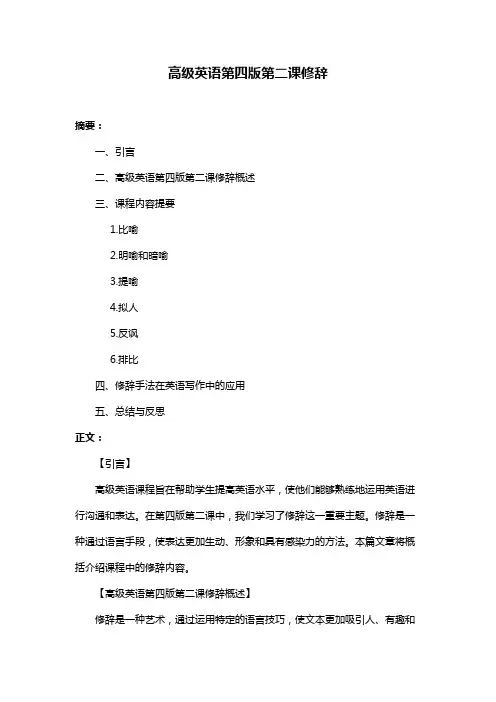
高级英语第四版第二课修辞摘要:一、引言二、高级英语第四版第二课修辞概述三、课程内容提要1.比喻2.明喻和暗喻3.提喻4.拟人5.反讽6.排比四、修辞手法在英语写作中的应用五、总结与反思正文:【引言】高级英语课程旨在帮助学生提高英语水平,使他们能够熟练地运用英语进行沟通和表达。
在第四版第二课中,我们学习了修辞这一重要主题。
修辞是一种通过语言手段,使表达更加生动、形象和具有感染力的方法。
本篇文章将概括介绍课程中的修辞内容。
【高级英语第四版第二课修辞概述】修辞是一种艺术,通过运用特定的语言技巧,使文本更加吸引人、有趣和易于理解。
在高级英语第四版第二课中,我们学习了多种修辞手法,包括比喻、明喻和暗喻、提喻、拟人、反讽和排比等。
这些修辞手法可以帮助我们更有效地传达思想和感情。
【课程内容提要】1.比喻:比喻是通过将一个事物与另一个事物相比较,从而形象地表达出某种特性的修辞手法。
例如:“时间是金钱。
”2.明喻和暗喻:明喻是直接比较两个事物,而暗喻则是通过暗示进行比较。
例如:“她的眼睛是星星。
”(明喻)和“她是个睡美人。
”(暗喻)3.提喻:提喻是通过部分代表整体或通过整体代表部分的修辞手法。
例如:“杯水车薪。
”4.拟人:拟人是一种赋予非人类事物人类特征的修辞手法。
例如:“月亮害羞地躲在云朵后面。
”5.反讽:反讽是通过表达与字面意义相反的意义,从而产生幽默或讽刺效果的修辞手法。
例如:“祝你度过一个美好的时光。
”(用于分手场景)6.排比:排比是通过重复相同或类似的结构,以强调某个观点或情感的修辞手法。
例如:“生命在于运动,健康在于运动,美丽在于运动。
”【修辞手法在英语写作中的应用】在英语写作中,运用修辞手法可以使文章更具表现力和吸引力。
例如,使用比喻可以使抽象概念更具体化,使用拟人可以让描述更生动有趣。
恰当运用修辞手法有助于作者更好地传达思想和情感,同时也能让读者在阅读过程中获得愉悦。
【总结与反思】通过学习高级英语第四版第二课中的修辞内容,我们了解了多种修辞手法及其在英语写作中的应用。
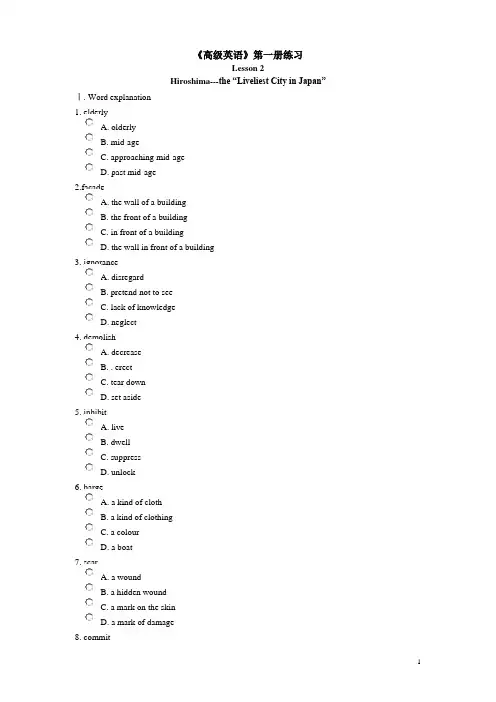
《高级英语》第一册练习Lesson 2Hiroshima---the “Liveliest City in Japan”Ⅰ. Word explanation1. elderlyA. olderlyB. mid-ageC. approaching mid-ageD. past mid-age2.facadeA. the wall of a buildingB. the front of a buildingC. in front of a buildingD. the wall in front of a building3. ignoranceA. disregardB. pretend not to seeC. lack of knowledgeD. neglect4. demolishA. decreaseB. . erectC. tear downD. set aside5. inhibitA. liveB. dwellC. suppressD. unlock6. bargeA. a kind of clothB. a kind of clothingC. a colourD. a boat7. scarA. a woundB. a hidden woundC. a mark on the skinD. a mark of damage8. commitA. to doB. to commissionC. to trustD. to place an order9. preserveA. to keep from dangerB. . to serve in advanceC. . to saveD. . to reserve10. consist ofA. be composed ofB. be composed ofC. containD. include11. lumpA. lampB. massC. limpD. lung12. gratitudeA. appreciationB. thankfulnessC. gratefulnessD. all the above13. haltA. stopB. preventC. saluteD. alter14. destinationA. destinyB. desperateC. goalD. doom15. sketchA. stretchB. skepticC. scratchD. drawⅡ. Replace each underlined part with one word learnt in the text, the first letter of which is given:1. The teacher answered with a brief nod of agreement. a2. The book was so interesting that I was practically unconscious of my surroundings. o3. The thought of his past experience of stealing brings him a sudden sharp pain of conscience. t4. I see little hope of his recovery. p5. His greatest concern was how to find money for a holiday in Europe. p6. She shouldn't have come to the hotel suite. She shouldn't have delayed leaving --- this was fatal --- after others had left. l7. If I had been less careful I might have been more wise. c8. They faced one another in the boxing ring. e9. The town will build a monument to its war heroes. e10. She was deeply disturbed until she learned that her husband was among the survivors. aⅢ. Fill in each of the blanks with one of the following words or expressions in its proper form. Each word or expression is to be used only once.to have a lump in one's throat, spare, spectacle, on the part of, rub shoulders with, humiliate, shiver, sink in, in response, foldⅤ. Reading comprehension.1. The sentence “little girls and elderly ladies in kimonos rubbed shoulders with teenagers and women in western dress” shows that __.A. western influence and national tradition co-existed in JapanB. There were lots of female walking in the streets.C. . Little girls and elderly women wore kimonos but teenagers and women wore western dressD. Women in Japan wore different clothes2. The sentence “the usher bowed deeply and heaved a long, almost musical sigh” shows that __.A. the usher was pleasant and loved musicB. the usher was bored but still very politeC. the was boring but still kept his politenessD. the usher was boring but still wanted to keep himself in pleasant mood3.The author’s description of the mayor “he was a tall, thin man, sad-eyed and serious” shows that __.A. the meeting with the author who was an American reminded the mayor of the atomic crimeB. the mayor must be in sad mood that night.C. the author’s own mentality distorted the image of the mayorD. the mayor did not want to talk with the author4. The sentence “there are two different schools of thought in this city of oysters” means __.A. people in Hiroshima hold different opinions on the A-bomb attackB. people in Hiroshima hold different opinions on World War IIC. people in Hiroshima hold different opinions on how to treat the remnants of the A-bomb attack.D. people in Hiroshima hold different opinions on how to preserve their memory of the A-bomb attack5. The sentence “the very sight of which would send shivers down the spine of any healthy visitor” mea ns __.A. any healthy visitor would feel uneasy when he saw the medical instrumentsB. Any healthy visitor would start trembling when he saw the medical instrumentsC. the medical instruments were burnished and coldD. as soon as he saw the cold medical instruments, the visitor began shivering6. The expression “earthly cares” in this text can be bes t understood as __.A. daily worries such as food, clothing and housing etcB. global considerations such as environment and climate etcC. social conflicts such as terrorism, disarmament and racial discimination etc.D. everyday business such as economy and finance etc.第一册第2课练习答案1-1: /答案:D 1-2: /答案:B 1-3: /答案:C 1-4: /答案:C 1-5: /答案:C 1-6: /答案:D 1-7: /答案:D 1-8: /答案:A 1-9: /答案:A 1-10: /答案:A 1-11: /答案:B 1-12: /答案:D 1-13: /答案:A 1-14: /答案:C 1-15: /答案:D 2-1: /答案:assent2-2: /答案: oblivious2-3: /答案:twinge2-4: /答案:prospect2-5: /答案:preoccupation 2-6: /答案: lingered2-7: /答案: cautious2-8: /答案:encountered 2-9: /答案:erect2-10: /答案: agitated3-1: /答案: sink in3-2: /答案: spectacle3-3: /答案: on the part of3-4: /答案: in response3-5: /答案: had a lump in her throat 3-6: /答案: to rub shoulders with3-7: /答案: Fold3-8: /答案:humiliating3-9: /答案:spared3-10: /答案: shivering4-1: /答案:A4-2: /答案:B4-3: /答案:C4-4: /答案:D4-5: /答案:A4-6: /答案:A。
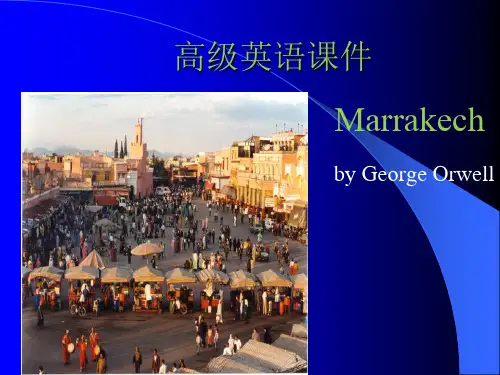

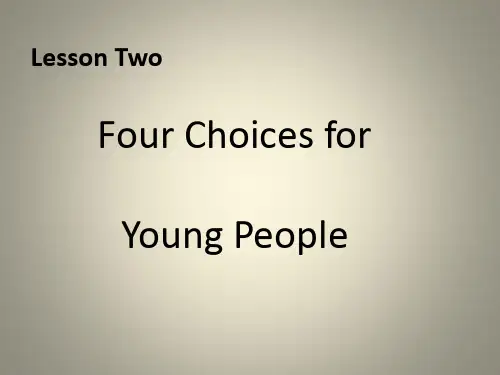
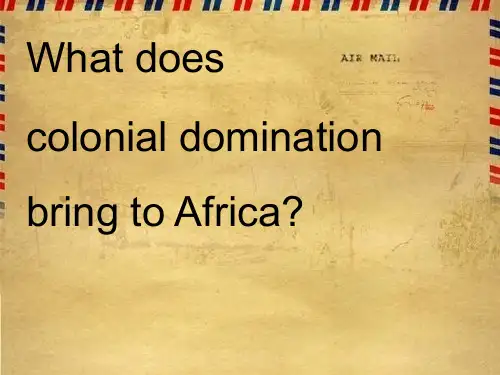
Hiroshima---the “Liveliest” City in JapanI. Paraphrase1) Serious-looking men were so absorbed in their conversation that they seemednot to pay any attention to the crowds around them.2) At last the taxi trip came to an end and I suddenly discovered that I was in frontof the gigantic City Hall.3) The rather striking picture of traditional floating houses among high, modernbuildings represents the constant struggle between traditional Japanese culture and the new, Western style.4)1 suffered from a strong feeling of shame when I thought of the prospect ofmeeting the mayor of Hiroshima in my socks.5)The few Americans and Germans also seemed to feel restrained like me.6)After three days in Japan one gets quite used to bowing to people as a ritual toshow gratitude.7)1 was on the point of showing my agreement by nodding when I suddenlyrealized what he meant.His words shocked me out of my sad dreamy thinking.8)…and nurse s walked by carrying surgical instruments which were nickel platedand even healthy visitors when they see those instruments could not help shivering.9) I have the chance to raise my moral standard because of the illness.II. Practice with Words and ExpressionsA.1.lump: the feeling you get in your throat when you are going to cry2.rub shoulders with: (informal) meet and mix with (people)3.martyred: (the city) that has been made to suffer4.screech: make a harsh, piercing sound5.arresting: striking, attracting and holding the attentionskyscrapers: very tall buildings6.stunning: very attractive; delightfully beautiful7.sink in: (to be) fully absorbed or understood8.schools: groups of people sharing the same thought9.by trade: by occupation; by way of making a livingB.1)was指事实如此;而must be意为“很可能”。
• 1. mourner: n.•person who attends a funeral as a relative or friend of the dead•送葬者;哀悼者•mourn: v. grieve for哀悼• e.g.: The whole nation had mourned (for) the death of their great leader.•举国上下哀悼他们的伟大领袖。
•Silent mourning•Mourn for the deceased• 2. thread: v. pass through like a thread 穿过•thread one’s way through:•find, pick, one’s way through (a crowd, streets, etc) 挤过(人群);穿过(街道)• e.g.: I thread my way through the crowded streets.•On holidays, if you go shopping, you have to thread your way through the crowd, which is very annoying sometimes.•如果节假日里去购物,不得不在人群中挤,这有时很烦人。
• 3. wail: v. cry in a loud, usually shrill voice 悲伤地哭泣或哀嚎• e.g.:1) She was wailing for her lost child.她为失去的孩子哭泣。
•2) wails (over) one’s misfortunes•为自己的不幸而哀泣•3)The wind wailed through the trees.•风穿过树林发出似嚎叫的声音。
• 4. chant: n. a song in which words are repeated in a monotonous tone of voice 单调的歌• e.g.: The mourners wailed a short chant over and over again.•送葬者的口里一遍一遍地哀号着一支短促的悲歌。
Lesson 2: Four Choices for Young PeopleShortly before his graduation, Jim Binns, president of the senior class at Stanford University, wrote me about some of his misgivings. "More than any other generation," he said, "our generation views the adult world with great skepticism... there is also an increased tendency to reject completely that world."Apparently he speaks for a lot of his contemporaries. During the last few years, I have listened to scores of young people, in college and out, who were just as nervous about the grown-p world. Roughly, their attitude might be summed up about like this: "The world is in pretty much of a mess, full of injustice, poverty, and war. The people responsible are, presumably, the adults who have been running thing. If they can't do better than that, what have they got to teach our generation? That kind of lesson we can do without."There conclusions strike me as reasonable, at least from their point of view. The relevant question for the arriving generation is not whether our society is imperfect (we can take that for granted), but how to deal with it. For all its harshness and irrationality, it is the only world we've got. Choosing a strategy to cope with it, then, is the first decision young adults have to make, and usually the most important decision of their lifetime. So far as I have been able to discover, there are only four basic alternatives:1. Drop OutThis is one of the oldest expedient s, and it can be practiced anywhere, at any age, and with or without the use of hallucinogens. It always has been the strategy of choice for people who find the world too brutal or too complex to be endured. By definition, this way of life is parasitic. In one way or another, its practitioners batten on the society which they scorn and in which they refuse to take any responsibility. Some of us find this distasteful - an undignified kind of life. Butfor the poor in spirit, with low levels of both energy and pride, it may be the least intolerable choice available.2. FleeThis strategy also has ancient antecedents. Ever since civilization began, certain individuals have tried to run away from it in hopes of finding a simpler, more pastoral, and more peaceful life. Unlike the dropouts, they are not parasites. They are willing to support themselves and to contribute something to the general community, but they simply don't like the environment of civilization; that is, the city, with all its ugliness and tension.The trouble with this solution is that it no longer is practical on a large scale. Our planet, unfortunately, is running out of noble savages and unsullied landscape; except for the polar regions, the frontiers are gone. A few gentleman farmers with plenty of money can still escape to the bucolic life - but in general the stream of migration is flowing the other way.3. Plot a RevolutionThis strategy is always popular among those who have no patience with the tedious working of the democratic process or who believe that basic institutions can only be changed by force. It attracts some of the more active and idealistic young people of every generation. To them it offers a romantic appeal, usually symbolized by some dashing and charismatic figure.It has the even greater appeal of simplicity: "Since this society is hopelessly bad, let's smash it and build something better on the ruins."Some of my best friends have been revolutionists, and a few of them have led reasonably satisfying lives. These are the ones whose revolutions did not come off; they have been able to keep on cheerfully plotting their holocausts right into their senescence. Others died young, in prison or on the barricade s. But the most unfortunate are those whose revolutions havesucceeded. They lived, in bitter disillusionment, to see the establishment they had overthrown replaced by a new one, just as hard-faced and stuffy.I am not, of course, suggesting that revolutions accomplish nothing. Some (The American Revolution, the French Revolution) clearly do change things for the better. My point is merely that the idealists who make the revolution are bound to be disappointed in either case. For at best their victory never dawns on the shining new world they had dreamed of, cleansed of all human meanness. Instead it dawns on a familiar, workaday place, still in need of groceries and sewage disposal. The revolutionary state, under whatever political label, has to be run-not by violent romantics-but by experts in marketing, sanitary engineering, and the management of bureaucracies.For the idealists who are determined to remake society, but who seek a more practical method that armed revolution, there remains one more alternative.4. Try to Change the World Gradually, One Clod at a TimeAt first glance, this course is far from inviting. It lacks glamour. It promises no quick results. It depends on the exasperating and uncertain instruments of persuasion and democratic decision making. It demands patience, always in short supply. About all that can be said for it is that it sometimes works - that in this particular time and place it offers a better chance for remedying some of the world's outrages than any other available strategy.So at least the historical evidence seems to suggest. When I was graduating from college, my generation also found the world in a mess. The economic machinery had broken down almost everywhere: In this country nearly a quarter of the population was out of work. A major war seemed all too likely. As a college newspaper editor at that time, I protested against this just as vehemently as student activists are protesting today.At the same time, my generation was discovering that reforming the world is a little like fighting a military campaign in the Apennines, as soon as you capture one mountain range, another one looms just ahead. As the big problems of the thirties were brought under some kind of rough control, new problems took their place - the unprecedented problems of an affluent society, of racial justice, of keeping our cities from becoming uninhabitable, of coping with war in unfamiliar guises. Most disturbing of all was our discovery of the population explosion. It dawned on us rather suddenly that the number of passengers on the small spaceship we inhabit is doubling about every forty years. So long as the earth's population keeps growing at this cancerous rate, all of the other problems appear virtually insoluble. Our cities will continue to become more crowded and noisome. The landscape will get more clutter ed, the air and water even dirtier. The quality of life is likely to become steadily worse for everybody. And warfare on a rising scale seems inevitable if too many bodies have to struggle for ever-dwindling shares of food and living space.So Jim Binns' generation has a formidable job on its hands. But not, I think, an insuperable one. On the evidence of the past, it can be handled in the same way that hard problems have been coped with before-piecemeal, pragmatically, by the dogged 勤劳的蜜蜂有糖吃efforts of many people.。
Hiroshima--- the“Liveliest” City in JapanI.Paraphrase1)Serious-looking men were so absorbed in their conversation that theyseemed not to pay any attention to the crowds around them.2)At last the taxi trip came to an end and I suddenly discovered that I was infront of the gigantic City Hall.3) The rather striking picture of traditional floating houses among high, modernbuildings represents the constant struggle between traditional Japanese culture and the new, Western style.4)1 suffered from a strong feeling of shame when I thought of the prospect ofmeeting the mayor of Hiroshima in my socks.5)The few Americans and Germans also seemed to feel restrained like me.6)After three days in Japan one gets quite used to bowing to people as a ritualto show gratitude.7)1 was on the point of showing my agreement by nodding when I suddenlyrealized what he meant. His words shocked me out of my sad dreamy thinking.8)⋯and nurses walked by carrying surgical instruments which were nickel platedand even healthy visitors when they see those instruments could not help shivering.9)I have the chance to raise my moral standard because of the illness.II. Practice with Words and ExpressionsA.1.lump: the feeling you get in your throat when you are going to cry2.rub shoulders with: (informal) meet and mix with (people)3.martyred: (the city) that has been made to suffer4.screech: make a harsh, piercing sound5.arresting: striking, attracting and holding the attentionskyscrapers: very tall buildings6.stunning: very attractive; delightfully beautiful7.sink in: (to be) fully absorbed or understood8.schools: groups of people sharing the same thought9.by trade: by occupation; by way of making a livingB.1)was 指事如此;而 must be 意“很可能”。
第二课广岛——日本“最有活力”的城市雅各•丹瓦“广岛到了!大家请下车!”当世界上最快的高速列车减速驶进广岛车站并渐渐停稳时,那位身着日本火车站站长制服的男人口中喊出的一定是这样的话。
我其实并没有听懂他在说些什么,一是因为他是用日语喊的,其次,则是因为我当时心情沉重,喉咙哽噎,忧思万缕,几乎顾不上去管那日本铁路官员说些什么。
踏上这块土地,呼吸着广岛的空气,对我来说这行动本身已是一套令人激动的经历,其意义远远超过我以往所进行的任何一次旅行或采访活动。
难道我不就是在犯罪现场吗?这儿的日本人看来倒没有我这样的忧伤情绪。
从车站外的人行道上看去,这儿的一切似乎都与日本其他城市没什么两样。
身着和嘏的小姑娘和上了年纪的太太与西装打扮的少年和妇女摩肩接豫;神情严肃的男人们对周围的人群似乎视而不见,只顾着相互交淡,并不停地点头弯腰,互致问候:“多么阿里伽多戈扎伊马嘶。
”还有人在使用杂货铺和烟草店门前挂着的小巧的红色电话通话。
“嗨!嗨!”出租汽车司机一看见旅客,就砰地打开车门,这样打着招呼。
“嗨”,或者某个发音近似“嗨”的什么词,意思是“对”或“是”。
“能送我到市政厅吗?”司机对着后视镜冲我一笑,又连声“嗨!”“嗨!”出租车穿过广岛市区狭窄的街巷全速奔驰,我们的身子随着司机手中方向盘的一次次急转而前俯后仰,东倒西歪。
与此同时,这座曾惨遭劫难的城市的高楼大厦则一座座地从我们身边飞掠而过。
正当我开始觉得路程太长时,汽车嘎地一声停了下来,司机下车去向警察问路。
就像东京的情形一样,广岛的出租车司机对他们所在的城市往往不太熟悉,但因为怕在外国人面前丢脸,却又从不肯承认这一点。
无论乘客指定的目的地在哪里,他们都毫不犹豫地应承下来,根本不考虑自己要花多长时间才能找到目的地。
这段小插曲后来终于结束了,我也就不知不觉地突然来到了宏伟的市政厅大楼前。
当我出示了市长应我的采访要求而发送的请柬后,市政厅接待人员向我深深地鞠了一躬,然后声调悠扬地长叹了一口气。
Chant religious song
Derelict abandoned
Hummock a low rounded hill
Stow hide away
Frenzied full of uncontrolled excitement
Fodder rough food
Clamour noisily express
Desolate barren
Slump sink down
Squash squeeze
Plight condition
Infuriate fill with rage
Inquisitive unnecessarily curious
Sidle walk sideways
Nibble take small bits
Ghetto area
Navvy a labourer
Lucerne plant
Scrap small piece
Hack dig roughly
Stork white bird
Clump walk
Garrison military camp
Hobble walk in difficulty with small steps
Identify equate
Literally actually
Rag a scrap of cloth
Bumpy rough
Acre a wide expanse of land
Witchcraft magic
Jewish quarter of a town, a part of a city in which a group of people live who are poor ghetto of the Middle Ages medieval
back part of an animal including the legs hindquarters
having difficulty to distinguish undifferentiated
framework of all bones in a human or animal body skeleton
town, city, district with local self-government municipality
cause to bend, curve, or twist out of shape warp
group of trees grove
soldiers who fight on foot infantry
injure or make sore by rubbing gall
of, relating to, or belonging to the era before recorded history prehistoric
a container made to be carried on the back of a person or an animal pack
to shine by reflection with a sparkling luster glisten
a feeling of profound awe and respect and often love reverence
to deceive in fun; fool kid
a formation, as of troops or vehicles, in which all elements follow one behind the other column one that inhabits a place, especially as a permanent resident inhabitant
easily broken or destroyed frail
a crossbar with two U-shaped pieces that encircle the necks of a pair of oxen or other draft animals working together yoke
a trench, furrow, or groove channel
to cause to shrivel and dry up mummify
of or relating to an earliest or original stage or state primitive
to become reduced in amount or value; dwindle shrink
very good or satisfying; praiseworthy splendid
to inhabit or overrun in numbers large enough to be harmful infest
1. The child[01]for the toy.
2. We took a long walk and[02] wound up at the edge of town.
3. I think what[03appeals to]me about his painting is the colours he uses.
4. Nowadays, the streets in some places of the city[04] were infested with drugs.
5. The policemen were trying [05] to wring the truth out of the recalcitrant witness.
6. The temperature[06] has lowered gradually this month.
7. He has made a[07] splendid performance in the examinations.
8. The wooden frame[08] warped in the humidity.
9. The office was a scene of[09] frenzied activity this morning.
10. Air is[10] invisible but we can feel its motion when there is a wind。